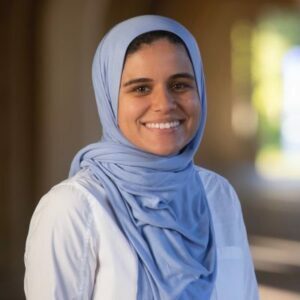Member Insight – Hoda S. Abdel Magid
 What sparked your decision to become an epidemiologist?
What sparked your decision to become an epidemiologist?
I never knew what epidemiology was before taking my first epidemiology course as an undergraduate. This course sparked my interest in the field because it gave me a glimpse into the multifaceted nature of epidemiology. I remember learning about the applications of epidemiology in a range of topics—everything from incarcerated populations to cancer to health equity. I was hooked and knew that the medical school plans that I had once thought were for me would soon be very placed.
What do you see as the biggest obstacle facing epidemiologists in the next five years?
There has been a lot of literature, especially lately, on structural social determinants of health (e.g., access to healthy foods, recreational and health care facilities, etc). Nevertheless, there has been less strides in interventions for reducing disparities in structural social determinants of health. I believe one of the biggest obstacles facing our field in the next five years is moving from the vast evidence base to developing and implementing effective interventions to create equitable access to structural resources. Leveraging and learning from studies of the impact of structural determinants on different health outcomes will be key.
Do you have any pets?
Not officially, but we’re working towards this. During the pandemic, there has been a stray cat that comes up to our backyard screen door daily and just hangs out. We fed her once and she has come back ever since. She became a member of our family when we started to include cat food on our grocery lists. Her name is Pomona, full name Pomona Sprout (yes, after the Hogwarts Herbology Professor).
Why did you join SER? What keeps you coming back?
The people. SER has helped me grow not only as an epidemiologist, but as a person. I have met some of the smartest and kindest people through SER. SER has provided me a platform to connect with my peers and role models in our field. It has helped me foster collaborations and provide the space to make a contribution to our field outside of research, such as through SER’s Diversity, Equity, and Inclusion committee.
I also need to give a special shout out to #epitwitter. I love #epitwitter. I have learned so much from all of the epidemiologists on twitter and as someone who has never been an avid social media user, I could never have imagined that twitter could be so helpful for my daily life! It is wonderful to see the human side of all of the epidemiologists in our field. Special shout out to some of my favorite #epitwitter podcasts: @ShinyEpiPeople and @AcaDamesPodcast.
What advice do you give students who want to become epidemiologists?
Talking to people. Talk to as many people in epidemiology and public health in general as you can! Epidemiologists have varying career paths, conducting research in many different sub disciplines of epidemiology. If you find someone you are interested in speaking with, I would reach out to them and ask them for a quick chat to learn about their work and career path.
If you are applying for a program or grant, I would make sure to reach out to mentors in advance to account for both of your schedules. It is important to be strategic about your time with all mentors as their time is usually limited. Preparing in advance—including sending materials before your meeting and writing down the questions you would like to ask them during your meeting—will ensure that you will get the most out of your time together.
Finally, don’t be afraid to leverage your academic community resources. Speaking with as many people in epidemiology and public health as possible can help you navigate resources at both your institution and other institutions.
Outside of epidemiology what do you enjoy doing?
Cooking (more than baking), swimming, running, yoga, and spending time with my family. Recently, my sisters and I have taken up surfing. It is very challenging and rewarding. I am still very much a beginner, but I am practicing!
What is something that not many people know about you?
I was born in Cairo, Egypt, where I lived until the age of five, before my family and I immigrated to the United States. I identify as Egyptian-American. One of my favorite things to do is to spend time with my grandparents in Egypt. I am very much looking forward to post-pandemic life so I can visit them again.
